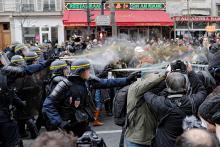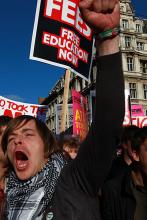Corbyn's Scottish woes
The Corbyn effect has not been able to turn around the Labour Party's disastrous general election result in Scotland. Bob Fotheringham outlines the obstacles facing Labour in the Holyrood elections this May.
On the surface Scotland — an almost Tory-free zone since 1997 — should provide fertile ground for a Corbyn-led Labour Party. Opposition to austerity, war, Trident and support for refugees are all now deeply ingrained in the political culture.
During Corbyn’s election campaign thousands turned up to hear him at meetings across Scotland. This seemed to reinvigorate the Labour Party, particularly those members who identify with the left. Corbyn spoke at a rally of almost 2,000 in Glasgow organised by the Scottish TUC in opposition the Tories’ Trade Union Bill.








